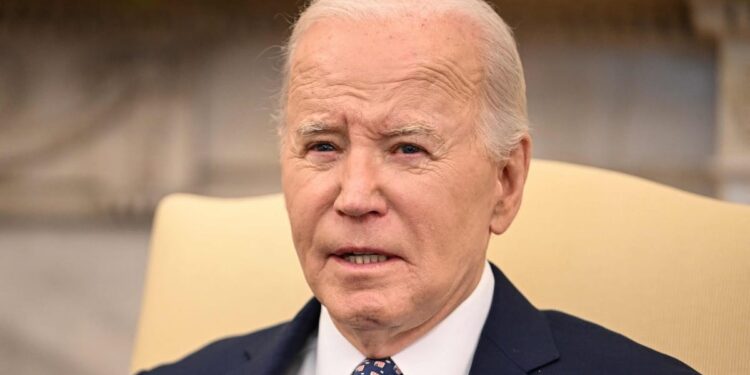Joe Biden warned US Congressional officials on Tuesday of the “terrible” cost of not passing a new $60 billion in financial aid for Ukraine but talks at the White House are failing. did not help resolve the situation.
• Read also: Hope for a truce in Gaza next week revived by Washington
• Read also: US destroys Houthi drones and anti-missile systems
The Democratic president organized a meeting in the Oval Office to try to convince Mike Johnson, the Republican president of the House of Representatives, to release a vital envelope for Kyiv and avoid a paralysis of the American government.
Congressional leaders have been relatively optimistic about the possibility of avoiding a “shutdown,” the shutdown of the federal administration when no agreement on the budget is reached in time. But nothing changed on Ukraine, with Mike Johnson declaring that the priority remained the wave of immigration to the southern border of the United States.
“The country’s priority is our border” with Mexico, and “we have to take care of America’s needs first,” he told reporters.
Despite the Ukrainian government’s increasingly pressing appeals to the West for continued support, the United States has failed to release $60 billion in additional aid.
It is stuck in the House of Representatives, where the shadow of Donald Trump, the ultra favorite of the Republicans for the November election, looms large, who is first calling for a tightening of immigration legislation.
Mike Johnson refuses to put the text in question on the agenda, which also provides for a new envelope for Israel, humanitarian aid for Gaza, as well as a reform of the American migration system.
“Blind obedience”
“We told (Mike Johnson): (…) History is looking over your shoulder. And if you don’t do the right thing, whatever the immediate policy, you will regret it,” stressed Senate Democratic leader Chuck Schumer.
“It’s in his hands,” commented the elected official, just back from a trip to Ukraine.
In a letter, he said that Mike Johnson “cannot let politics or blind obedience to Donald Trump get in the way.”
- Listen to the interview with Michel Roche, specialist in the USSR and Russia on Richard Martineau’s show via QUB :
Joe Biden hammered home “the urgency for Congress to continue to stand alongside Ukraine.”
The US president also “explained how Ukraine has lost battlefield ground in recent weeks and is forced to ration its munitions and supplies due to Congressional inaction,” according to a statement released by the House. -White at the end of the meeting.
Ukrainian leaders on Sunday called on Western countries to maintain their military aid, two years after the start of the invasion of Ukraine on February 24, 2022.
The White House, on the other hand, announced on Tuesday that “the United States will not send soldiers to fight in Ukraine”, while French President Emmanuel Macron has not ruled out the idea of sending ground troops.
“Real progress”
The president, who hopes to be re-elected to the White House next November, must also face, just two months after the last agreement, a new threat of shutdown of the federal administration.
Part of the budget expires on Friday, the other a week later, the day after Joe Biden’s State of the Union speech.
The right wing of the Republican Party has made no secret of the fact that it would be happy if this ax fell.
Unpaid air traffic controllers, shut down administrations, frozen food aid, unmaintained national parks… The list of potential consequences is long.
On this point, Mike Johnson said he was “optimistic”, specifying that elected officials from both sides believe they can “reach an agreement (…) and prevent a ‘shutdown'”.
Chuck Schumer hailed “real progress” and was “cautiously optimistic”.
The deep disagreements between Democrats and Republicans, mainly among the most right wing, are forcing Congress to function in the short term, illustrating the dysfunctions within the American institutional apparatus.
Congress has not approved any of the 12 spending bills making up the 2024 federal budget, which began almost five months ago, on October 1.
The solution could again be short-term: maintain spending at current levels and extend the deadline, for the fourth time since the start of the budget year.



